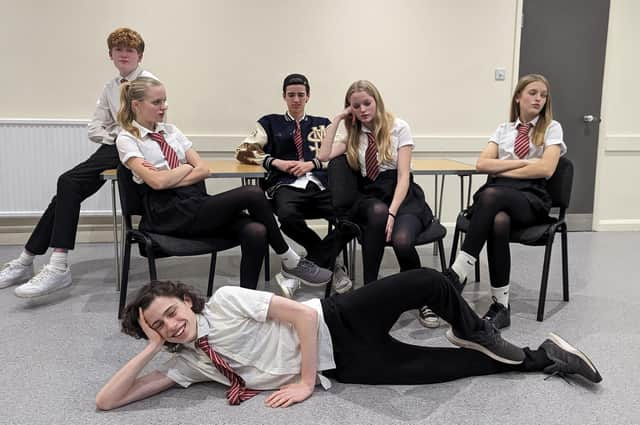Henfield youth theatre tackle classic comedy Teechers


Spokeswoman Mandy Ainsworth said: “Directed by Karen Blunden, this is the group’s third and, without doubt, most demanding play to date with all six cast members taking on multiple roles in the play within a play. Written in 1984, Teechers focuses on three year 11 students (played by Alex Carter, Robyn Thomas and Orla Williams), their passion for drama and the impact this subject has on their lives, Godber insinuating that drama should form an essential part of the school curriculum. Although the set, costumes, lighting etc are reduced to the bare minimum, the cast of six have worked tirelessly with huge enthusiasm and imagination to meet the demands Teechers presents.”
Production dates are Friday, February 24 and Saturday, February 25 at 7pm, with a matinee on the Saturday at 2.30pm, in The Henfield Hall. The evening performances will also include a fun school dinner – either a meat or vegetarian option – “like school dinners of old”, Mandy says – and sitting to eat from 7pm. The show has been sponsored by Andy Blunden Ceramic Wall & Floor Tilers Ltd.
Advertisement
Hide AdAdvertisement
Hide Ad“Tickets to see this talented group of young actors are available online via https://www.henfieldtheatrecompany.com/ or at Steven’s Estate Agents in Henfield High Street at a cost of £20 for the evening performances (including dinner) and £8 for the Saturday matinee performance (without dinner).”
It’s a piece special to Godber. As he says, the play is story-telling theatre: “It’s all part and parcel of what we wanted to do when I came to Hull – the demystification of the theatre.” The point is to bring people in who wouldn’t ever have dreamt of going to the theatre - people put off by pretentiousness and by the “self-centred sense of self-importance” some theatres throw up.
“My research degree was in German theatre, and their theatre is very very wide in its offer. I was hugely influenced by Bertolt Brecht. He made work that could play to a non-theatre going public. It’s great that barristers and doctors come to the theatre, but I also thought it would be great to see bricklayers and bouncers there as well. But in some theatres the fact that it could attract people that are not theatre-goers is actually anathema to the people making the art.” Which is precisely where we get Shakespeare so wrong - a playwright who was absolutely for the common man: “And yet we have deified him.”
As for Teechers, John wrote it in Rome: “I was on holiday. One of the challenges of being a playwright is that you can take your work anywhere! I had been a teacher so this was a fairly easy one to pick out. I had been a drama teacher, and I always felt that the arts were marginalised in schools.” Hence the play. The play is set in a large secondary school, with characters that audiences will instantly recognise: the trendy drama teacher, the grumpy caretaker and the wayward mob of pupils.